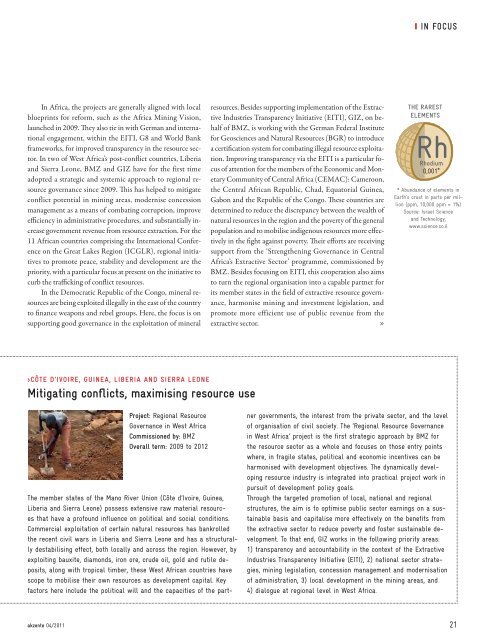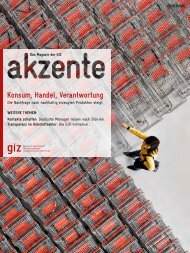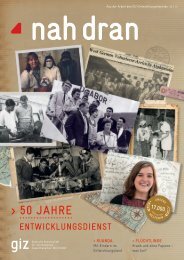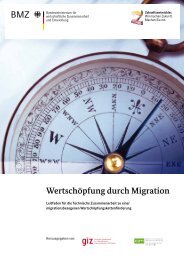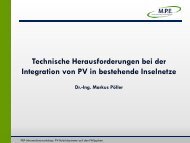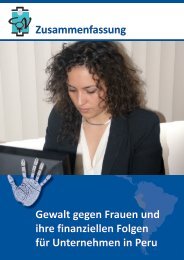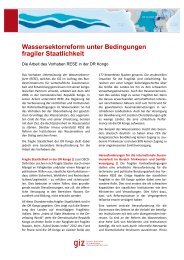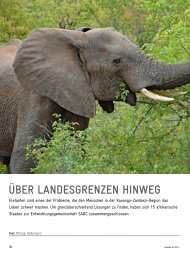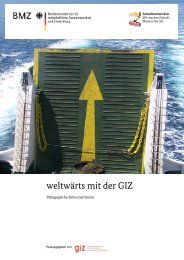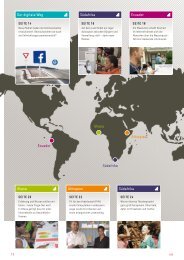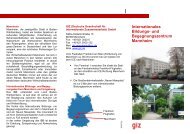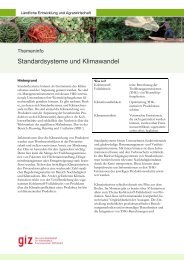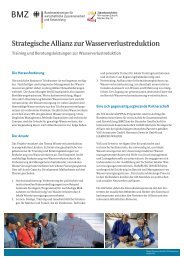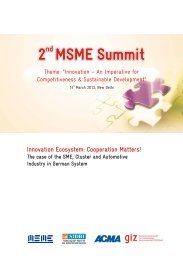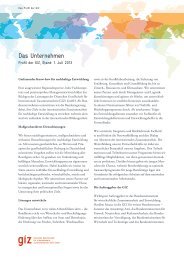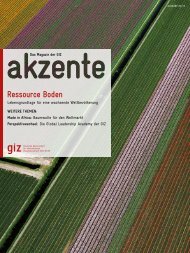Complete issue (pdf, 7520.08 MB, EN) - GIZ
Complete issue (pdf, 7520.08 MB, EN) - GIZ
Complete issue (pdf, 7520.08 MB, EN) - GIZ
Create successful ePaper yourself
Turn your PDF publications into a flip-book with our unique Google optimized e-Paper software.
In Africa, the projects are generally aligned with local<br />
blueprints for reform, such as the Africa Mining Vision,<br />
launched in 2009. They also tie in with German and international<br />
engagement, within the EITI, G8 and World Bank<br />
frameworks, for improved transparency in the resource sector.<br />
In two of West Africa’s post-conflict countries, Liberia<br />
and Sierra Leone, BMZ and <strong>GIZ</strong> have for the first time<br />
adopted a strategic and systemic approach to regional resource<br />
governance since 2009. This has helped to mitigate<br />
conflict potential in mining areas, modernise concession<br />
management as a means of combating corruption, improve<br />
efficiency in administrative procedures, and substantially increase<br />
government revenue from resource extraction. For the<br />
11 African countries comprising the International Conference<br />
on the Great Lakes Region (ICGLR), regional initiatives<br />
to promote peace, stability and development are the<br />
priority, with a particular focus at present on the initiative to<br />
curb the trafficking of conflict resources.<br />
In the Democratic Republic of the Congo, mineral resources<br />
are being exploited illegally in the east of the country<br />
to finance weapons and rebel groups. Here, the focus is on<br />
supporting good governance in the exploitation of mineral<br />
>CôTe d’IvOIre, GUINea, lIBerIa aNd SIerra leONe<br />
konflikte mitigating mindern, conflicts, rohstoffe maximising nutzen resource use<br />
akzente 04/2011<br />
Project: Regional Resource<br />
Governance in West Africa<br />
Commissioned by: BMZ<br />
Overall term: 2009 to 2012<br />
The member states of the Mano River Union (Côte d’Ivoire, Guinea,<br />
Liberia and Sierra Leone) possess extensive raw material resources<br />
that have a profound influence on political and social conditions.<br />
Commercial exploitation of certain natural resources has bankrolled<br />
the recent civil wars in Liberia and Sierra Leone and has a structurally<br />
destabilising effect, both locally and across the region. however, by<br />
exploiting bauxite, diamonds, iron ore, crude oil, gold and rutile deposits,<br />
along with tropical timber, these West African countries have<br />
scope to mobilise their own resources as development capital. Key<br />
factors here include the political will and the capacities of the part<br />
resources. Besides supporting implementation of the Extractive<br />
Industries Transparency Initiative (EITI), <strong>GIZ</strong>, on behalf<br />
of BMZ, is working with the German Federal Institute<br />
for Geosciences and Natural Resources (BGR) to introduce<br />
a certification system for combating illegal resource exploitation.<br />
Improving transparency via the EITI is a particular focus<br />
of attention for the members of the Economic and Monetary<br />
Community of Central Africa (CEMAC): Cameroon,<br />
the Central African Republic, Chad, Equatorial Guinea,<br />
Gabon and the Republic of the Congo. These countries are<br />
determined to reduce the discrepancy between the wealth of<br />
natural resources in the region and the poverty of the general<br />
population and to mobilise indigenous resources more effectively<br />
in the fight against poverty. Their efforts are receiving<br />
support from the ‘Strengthening Governance in Central<br />
Africa’s Extractive Sector’ programme, commissioned by<br />
BMZ. Besides focusing on EITI, this cooperation also aims<br />
to turn the regional organisation into a capable partner for<br />
its member states in the field of extractive resource governance,<br />
harmonise mining and investment legislation, and<br />
promote more efficient use of public revenue from the<br />
extractive sector.<br />
»<br />
IN FOCUS<br />
The rareST<br />
elemeNTS<br />
Rh<br />
rhodium<br />
0,001 *<br />
* Abundance of elements in<br />
Earth’s crust in parts per million<br />
(ppm, 10,000 ppm = 1%)<br />
Source: Israel Science<br />
and Technology,<br />
www.science.co.il<br />
ner governments, the interest from the private sector, and the level<br />
of organisation of civil society. The ‘Regional Resource Governance<br />
in West Africa’ project is the first strategic approach by BMZ for<br />
the resource sector as a whole and focuses on those entry points<br />
where, in fragile states, political and economic incentives can be<br />
harmonised with development objectives. The dynamically developing<br />
resource industry is integrated into practical project work in<br />
pursuit of development policy goals.<br />
Through the targeted promotion of local, national and regional<br />
structures, the aim is to optimise public sector earnings on a sustainable<br />
basis and capitalise more effectively on the benefits from<br />
the extractive sector to reduce poverty and foster sustainable development.<br />
To that end, <strong>GIZ</strong> works in the following priority areas:<br />
1) transparency and accountability in the context of the Extractive<br />
Industries Transparency Initiative (EITI), 2) national sector strategies,<br />
mining legislation, concession management and modernisation<br />
of administration, 3) local development in the mining areas, and<br />
4) dialogue at regional level in West Africa.<br />
21


